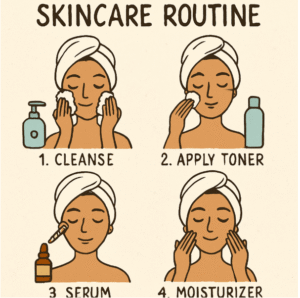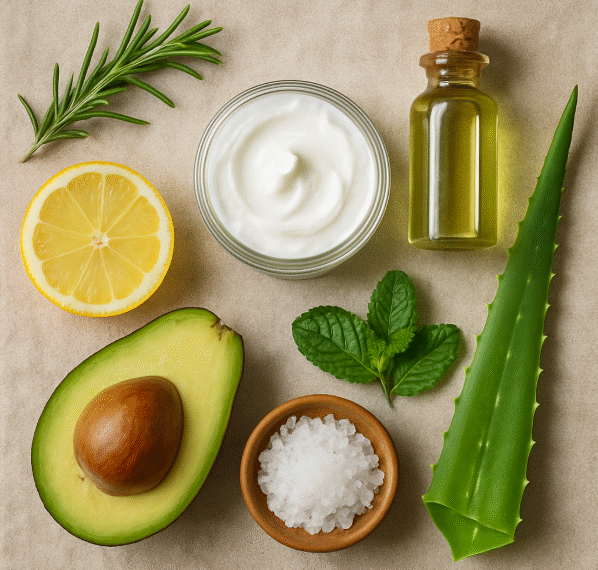The Evolution of Wellness
The contemporary wellness movement has undergone significant transformations, expanding from fitness and nutrition to a more inclusive approach that encompasses mental, emotional, and spiritual health. This holistic perspective is redefining how individuals view self-care, encouraging practices that nurture all aspects of well-being. Skincare, once considered a purely cosmetic endeavor, is now recognized as an essential component of this comprehensive wellness routine.
Skincare as Holistic Self-Care
The integration of skincare into the wellness paradigm emphasizes its role beyond aesthetics. Products that promote skin health are now seen as crucial for overall well-being, contributing to mental and emotional balance. This shift has led to a surge in demand for products that deliver both efficacy and safety, aligning with the body’s natural processes and promoting an internal sense of wellness that reflects outwardly.
The Rise of Natural Ingredients
A growing awareness of the potential adverse effects of synthetic compounds has driven consumers towards natural skincare solutions. Natural ingredients are perceived as safer and more in harmony with the body’s biological systems, offering benefits without the harsh side effects. This trend reflects a broader cultural movement towards sustainability and clean beauty, where the origins and impacts of products are as important as their results.
Key Natural Ingredients and Their Benefits
Retinol from Nature
Retinol, a derivative of vitamin A, is celebrated for its ability to boost skin cell turnover and stimulate collagen production, which improves skin elasticity.
Bakuchiol: A Gentle Alternative
Bakuchiol, derived from the seeds and leaves of the Psoralea corylifolia plant, offers similar benefits to traditional retinol but without the irritation that can accompany synthetic forms. Its gentle nature makes it suitable for sensitive skin types, broadening its appeal to a wider audience seeking effective anti-aging solutions.
The Science Behind Retinol Alternatives
Research into plant-based retinol alternatives is expanding, revealing promising results in terms of efficacy and tolerability. These natural compounds are being studied for their ability to mimic the benefits of retinol, providing anti-aging effects without disrupting the skin’s natural barrier or causing adverse reactions.
Retinol in a Holistic Skincare Routine
Incorporating natural retinol alternatives into a skincare routine can enhance overall skin health. These ingredients work synergistically with other natural compounds to provide comprehensive care, addressing not only signs of aging but also improving texture, tone, and hydration.
Hyaluronic Acid: Nature’s Moisturizer
Hyaluronic acid, naturally occurring in the body, is a powerful humectant, meaning it draws moisture into the skin, helping to maintain hydration and plumpness.
The Hydration Mechanism
Hyaluronic acid’s ability to retain moisture is due to its unique molecular structure, allowing it to hold up to 1000 times its weight in water. This property makes it an ideal ingredient for maintaining skin hydration, essential for plump, youthful-looking skin.
Hyaluronic Acid and Skin Rejuvenation
In anti-aging creams, hyaluronic acid supports skin rejuvenation by reducing the appearance of fine lines and wrinkles. By improving the skin’s moisture barrier, it enhances elasticity and resilience, contributing to a more youthful complexion.
Combining Hyaluronic Acid with Other Ingredients
When used in conjunction with other natural ingredients, hyaluronic acid can enhance the overall effectiveness of a skincare regimen. It acts as a delivery system, helping other active ingredients penetrate deeper into the skin, maximizing their benefits.
Green Tea Extract: The Antioxidant Powerhouse
Green tea extract is rich in antioxidants, particularly catechins, which protect the skin from oxidative stress caused by environmental factors such as pollution and UV radiation.
The Role of Antioxidants in Skincare
Antioxidants are crucial in combating free radicals, unstable molecules that can damage skin cells and accelerate aging. Green tea extract’s high catechin content helps neutralize these free radicals, preventing premature aging and maintaining skin health.
Anti-Inflammatory Benefits of Green Tea
Green tea extract’s anti-inflammatory properties help soothe irritated skin, reducing redness and swelling. This makes it a valuable ingredient in formulations aimed at calming sensitive or reactive skin types.
Green Tea in Daily Skincare Regimens
Incorporating green tea extract into daily skincare routines can provide long-term protective benefits. Its antioxidant and anti-inflammatory properties contribute to healthier, more resilient skin, making it a staple in natural anti-aging formulations.
Aloe Vera: Soothing and Healing
Aloe vera is renowned for its soothing, anti-inflammatory, and healing properties.
Aloe Vera’s Skin Repair Capabilities
Aloe vera promotes skin cell repair by stimulating the production of fibroblasts, cells that contribute to collagen synthesis. This helps restore skin elasticity and smoothness, essential for a youthful appearance.
Hydration and Aloe Vera
The natural composition of aloe vera makes it an excellent moisturizer, capable of penetrating the skin to deliver hydration without leaving a greasy residue. Its lightweight nature ensures it is suitable for all skin types, particularly beneficial for those with oily or combination skin.
Aloe Vera in Anti-Aging Formulations
In anti-aging creams, aloe vera’s combination of soothing and hydrating properties enhances skin texture and elasticity. Its effectiveness in promoting skin health naturally aligns with the growing demand for gentle yet potent skincare solutions.
Rosehip Oil: A Vitamin-Rich Elixir
Rosehip oil, extracted from the seeds of wild rose bushes, is rich in essential fatty acids and vitamins A and C.
Nutrient Profile of Rosehip Oil
The high concentration of vitamins and essential fatty acids in rosehip oil makes it a powerhouse for skin rejuvenation. These nutrients support collagen production, improve skin elasticity, and promote an even skin tone, addressing multiple signs of aging.
Deep Penetration and Absorption
Rosehip oil’s ability to penetrate deeply into the skin allows it to deliver nutrients effectively to the lower layers, where they can stimulate repair and regeneration. This deep absorption enhances its anti-aging benefits, making it a potent ingredient in skincare formulations.
Rosehip Oil in Skincare Routines
Incorporating rosehip oil into skincare routines can provide comprehensive benefits, from reducing the appearance of scars and hyperpigmentation to improving skin texture and elasticity. Its versatility makes it a valuable addition to any anti-aging regimen.
Consumer Behavior and Market Trends
The Informed Consumer
The shift towards natural ingredients in anti-aging products is not just a fleeting trend but a reflection of broader consumer behavior.
Prioritizing Transparency
Today’s consumers are more informed and conscientious about the products they use, prioritizing transparency in ingredient sourcing and formulation. This demand for honesty and openness in the beauty industry is driving brands to disclose more information about their products and practices.
Ethical Sourcing and Sustainability
Consumers are increasingly concerned with the ethical implications of their purchases, favoring brands that demonstrate sustainable and ethical sourcing practices. This shift is influencing the development of natural skincare products, as companies strive to meet these expectations.
The Role of Digital Platforms
Digital platforms and social media have amplified consumer voices, enabling them to share experiences and influence trends. This interconnectedness has heightened awareness of product efficacy and ethical standards, shaping consumer preferences and driving market change.
The Strategic Move for Wellness Brands
For wellness product developers, this means that integrating natural ingredients into formulations is not only a response to demand but also a strategic move.
Aligning with Consumer Values
By incorporating natural ingredients, brands can align with the values of sustainability and health consciousness that define modern consumerism. This alignment not only meets current demand but positions brands for long-term success in a competitive market.
Developing Trust and Loyalty
Brands that prioritize transparency and ethical practices can build trust and loyalty with consumers. By demonstrating a commitment to natural and sustainable solutions, they resonate with the growing number of consumers seeking products that reflect their values.
Innovating with Natural Ingredients
The push for natural ingredients encourages innovation in product development, inspiring brands to explore new formulations and technologies. This innovation fosters a dynamic market landscape, where creativity and efficacy drive brand differentiation.
Content and Strategies for Lifestyle Influencers
Lifestyle magazine editors and wellness coaches can leverage these insights by focusing on content and strategies that highlight the benefits of natural ingredients.
Educating the Audience
Providing educational content about the benefits and science behind natural ingredients can empower consumers to make informed choices. This approach not only enhances audience engagement but also positions influencers as trusted sources of information in the wellness space.
Bridging Wellness and Identity
Content that bridges wellness, identity, and social practices can resonate deeply with audiences seeking authenticity and alignment with their values. By highlighting the cultural and personal significance of natural skincare, influencers can connect with their audience on a more meaningful level.
Promoting Ethical and Sustainable Practices
Emphasizing ethical and sustainable practices in content can attract an audience eager for information that aligns with their values. By showcasing brands and products that prioritize these principles, influencers can drive awareness and support for natural skincare solutions.
Real-World Applications and Success Stories

Success Stories of Leading Brands
The success of brands that have embraced natural ingredients in their anti-aging lines underscores the efficacy and appeal of such products.
Tata Harper: Pioneering Clean Beauty
Tata Harper has built a reputation around clean, natural beauty, gaining a loyal following by championing transparency and efficacy. Their commitment to using only natural ingredients has set a standard in the industry, inspiring other brands to follow suit.
Herbivore Botanicals: A Focus on Purity
Herbivore Botanicals has gained acclaim for their dedication to purity and simplicity in skincare. By formulating products with minimal, natural ingredients, they have captured the attention of consumers seeking effective solutions without unnecessary additives.
Lessons for Emerging Brands
These brands provide templates for wellness product developers aiming to innovate in a competitive market. By emphasizing the potency and safety of natural ingredients, they resonate with consumers’ desires for products that enhance well-being without compromising health or ethical standards.
The Impact on Consumer Choices
The success of these brands has influenced consumer behavior, encouraging more individuals to explore natural skincare options.
Building Consumer Confidence
As consumers witness the efficacy of natural ingredients in established brands, their confidence in these solutions grows. This confidence fuels further exploration and adoption of natural skincare, expanding the market for these products.
Inspiring New Product Development
The popularity of natural ingredients has inspired new product development, as brands strive to meet the growing demand. This trend encourages continuous innovation, ensuring a steady influx of new and effective natural skincare solutions.
The Role of Testimonials and Reviews
Consumer testimonials and reviews play a significant role in shaping perceptions of natural skincare. Positive experiences shared by consumers reinforce the benefits of natural ingredients, further driving their popularity and adoption.
Conclusion
As the wellness industry continues to intertwine with skincare, understanding the role of natural ingredients in anti-aging creams becomes increasingly vital.
Embracing the Natural Trend
These ingredients not only offer tangible benefits for skin elasticity and rejuvenation but also reflect a broader cultural shift towards holistic and ethical self-care. By embracing this trend, the wellness and lifestyle sectors can stay attuned to consumer preferences and societal values.
Anticipating Future Demands
For those in the wellness and lifestyle sectors, embracing this trend means staying attuned to consumer preferences and societal values. By doing so, you can craft products, content, and strategies that not only meet the needs of today but also anticipate the demands of tomorrow’s wellness landscape.
Nurturing the Body with Nature
In the end, the natural ingredients in anti-aging creams do more than promise youthful skin—they embody a commitment to nurturing the body in harmony with nature. This philosophy resonates deeply in the evolving dynamics of wellness and self-care, offering a path to beauty that aligns with the principles of sustainability and ethical living.




